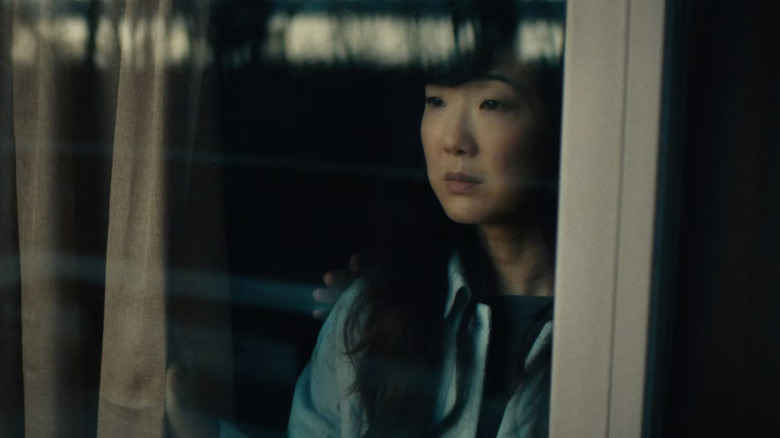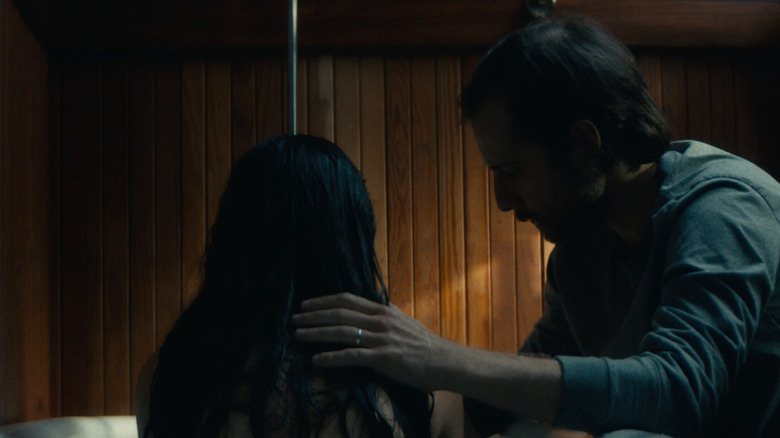Olivia West Lloyd’s movie “Somewhere Quiet,” which had a limited theatrical run in February of this year, is told through the unreliable perspective of Meg (Jennifer Kim), who recently escaped from a traumatic kidnapping. Meg joins her husband Scott (Kentucker Audley) at his isolated family compound in Cape Cod in an attempt to heal, but she keeps emotionally spiraling. This movie leaves a lot of breadcrumbs, but the audience is never able to follow the trail to a solid destination. The gritty details of Meg’s abduction — what exactly happened and why — are never fully revealed. What we do know is that Meg’s husband is terribly unsupportive, constantly dismissing her upset feelings. He mocks her fears of eating after the kidnapper poisoned her food and insists that she write in her journal instead of talking to him. All of this suggests that he might be hiding something.
Since “Somewhere Quiet” is from the point of view of someone in constant fight-or-flight mode, we are never quite sure what is real or what the truth is. As such, the audience never gets clear answers on circumstances such as who the strange, elderly woman in the woods is, why Scott is sleepwalking, or whether or not the family heirloom that Meg breaks is real. Meg cannot trust anyone, and as audience members, neither can we; this makes for a very perplexing and often frustrating filmgoing experience as we try to piece together what happens at the end of “Somewhere Quiet.”
Keeping it in the family
One of the biggest headscratchers in “Somewhere Quiet” is Scott’s true relationship with his cousin Madelin (played by Marin Ireland, who delivered a powerhouse supporting performance in last year’s “Eileen” and whose wide, targeted smile conceals sinister intentions). Their close bond is oddly flirtatious, marked by furtive glances and overly friendly touches. Meg often feels left out during Madelin’s frequent unannounced visits where she and Scott share inside jokes and fond memories. At one point, Madelin criticizes Meg for having a substantial trust fund, insisting that she will never understand the struggles of their family, who are not as wealthy as they appear to be.
Later in the film, Meg learns that Madelin had a younger brother who drowned at the family beach. “For most of my childhood, I thought I dreamt the whole thing,” Madelin wistfully recalls. This piece of dialogue captures the film’s surreal atmosphere, especially how Scott’s bizarrely intimate connection to his own cousin is a living nightmare for Meg. There are several subjective shots that take place at the beach where Scott and Madelin stare directly at the camera, smiling deviously as the water laps and fills the screen. Is this a flashback to Madelin and Scott conspiring to drown Meg for her trust fund money? Or is she imagining herself, like the little brother, also drowning? Meg spots Scott and Madelin kissing on the sand, but with cryptic nature of the film, this image could very well be a manifestation of her suspicions about their close relationship and not a vision of actual reality. The cousins’ peculiar attachment eventually comes to a head during the final scenes.
Confronting the cousins
Meg discovers shocking evidence that indicates her husband (and likely Madelin) either orchestrated her kidnapping or are exploiting her post-traumatic stress to gain access to her wealth. She discovers a document in which Scott petitions for power of attorney over her, along with a USB drive containing one of the humiliating ransom videos she was forced to make, which Scott claims he never received. Meg attempts to escape the island on her motorcycle, but ends up killing Madelin’s dog Minnow in the process. Their confrontation culminates with Meg capturing Madelin and tying her up in the basement.
Madelin taunts Meg, saying she will never escape her trauma because it now lives in her mind and body. As with everything in “Somewhere Quiet,” we aren’t sure whether or not Madelin is actually saying this. The edits are jumpy and the shots unfocused. Scott eventually discovers Meg and Madelin in the basement, and the confrontation between husband and wife turns violent. Scott confesses that he did receive the ransom video, but he was with Madelin at the time and had already mourned his wife and accepted her likely death. He even addresses and denies the idea that he set up her kidnapping, although he could be saying this as a diversion.
After their tussle, Meg wakes up to find Scott’s dead body on top of her. The final scene is the same as the opening where Meg threatens a driver with a shotgun and steals his truck. Meg screams and cries as she drives off, then stops and stands outside of the car. The peaceful silence is interrupted by the sound of sirens in the distance.
Looking for home
There’s no question that Scott and Madelin have a weirdly affectionate relationship. A townsperson even tells Meg that Scott was also at the compound last year, spending even more time with Madelin. The cousins clearly planned to take advantage of Meg’s mental instability, but whether or not they are behind the kidnapping is left unclear. The sirens in the final scene indicate that Meg’s murders of the cousins have been discovered. Her wounded psyche has finally pushed her to the brink. We never learn who the older woman is that Meg sees in the forest. Could it be Madelin’s bedridden mother? A memory of Meg’s adopted mother? A random ghost? Meg doesn’t seem to recognize her, so perhaps the figure symbolizes how something is very wrong with this northeastern enclave and she should try to escape as soon as possible.
There’s a vague connection between Meg’s kidnapping and themes of colonialism and adoption trauma. Adopted as a young child, Meg has few connections to her cultural history and is unable to speak Korean, unlike Madelin, whose family went to Korea as teachers and Christian missionaries. Scott and Madelin’s gaslighting and mistreatment of Meg is just another way their family exploits those in the Korean community. Meg has greater feelings of loneliness and distrust of others because she has been displaced from her home multiple times — taken from her biological family and country of origin, then later her home with Scott.
Since “Somewhere Quiet” lives entirely in Meg’s fractured mind and the reality of the situation is never explicitly presented on screen, any investigation into the objective truth of what happened at the end feels like conjecture. What we can definitively draw from the film, though, is, as Madelin says, the trauma we experience as both a child and adult (especially when it comes to adoption trauma) will be inside us forever.






